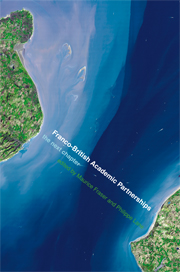Book contents
- Frontmatter
- Contents
- Notes on Contributors
- Foreword by His Excellency Bernard Emié
- Foreword by Sir Peter Westmacott
- Preface
- Part I Teaching and Training Partnerships
- 1 Why is the United Kingdom Important to Sciences Po?
- 2 Franco-Welsh Academic Partnerships: A Case Study Involving Transnational and Cross-sector Mobility
- 3 Double Diplomas: A Franco-British Training Route of Excellence for Teachers of French Worldwide?
- 4 The Entente Cordiale: A Grande École Engineering School Perspective
- 5 Links Between British Universities and French Instituts Universitaires de Technologie: New Forms of Collaboration
- 6 One Model: The Franco-German University
- 7 Raising Students' International Profile: How Do Universities Address This Issue in Europe?
- 8 Franco-British Academic Partnerships at the University of Provence
- 9 University College London and France: Teaching and Research Collaborations
- 10 Université Paris 1 Panthéon-Sorbonne: An Overview of More Than 30 Years of Franco-British Partnerships
- 11 Towards a Vision for a Networked European Business School
- Part II Research Partnerships
- Part III Broader Perspectives
- Appendices: Addresses and Speeches at the Franco-British Academic Partnerships Seminar, French Institute, London, 5 February 2010
- Index
3 - Double Diplomas: A Franco-British Training Route of Excellence for Teachers of French Worldwide?
from Part I - Teaching and Training Partnerships
- Frontmatter
- Contents
- Notes on Contributors
- Foreword by His Excellency Bernard Emié
- Foreword by Sir Peter Westmacott
- Preface
- Part I Teaching and Training Partnerships
- 1 Why is the United Kingdom Important to Sciences Po?
- 2 Franco-Welsh Academic Partnerships: A Case Study Involving Transnational and Cross-sector Mobility
- 3 Double Diplomas: A Franco-British Training Route of Excellence for Teachers of French Worldwide?
- 4 The Entente Cordiale: A Grande École Engineering School Perspective
- 5 Links Between British Universities and French Instituts Universitaires de Technologie: New Forms of Collaboration
- 6 One Model: The Franco-German University
- 7 Raising Students' International Profile: How Do Universities Address This Issue in Europe?
- 8 Franco-British Academic Partnerships at the University of Provence
- 9 University College London and France: Teaching and Research Collaborations
- 10 Université Paris 1 Panthéon-Sorbonne: An Overview of More Than 30 Years of Franco-British Partnerships
- 11 Towards a Vision for a Networked European Business School
- Part II Research Partnerships
- Part III Broader Perspectives
- Appendices: Addresses and Speeches at the Franco-British Academic Partnerships Seminar, French Institute, London, 5 February 2010
- Index
Summary
The Franco-English double degree master's FLE (Français Langue Etrangère)/PGCE (Postgraduate Certificate in Education) was set up in 2005. It originated from the double degree maîtrise FLE/PGCE created in 1992. Around 2002, the maîtrise FLE/PGCE degree evolved into a master's FLE/PGCE involving 10 partners: nine French universities (Paris 8, Paris 5, Paris Ouest-Nanterre-La Défense, Pau, Lyon 2, Aix-Marseille, Le Mans, Nancy and Strasbourg) and one English university (the University of Cumbria, UoC, on three sites – Lancaster, Carlisle and Greenwich). In 2007, a Scottish partner joined the existing consortium: the University of Glasgow. A Franco-Scottish double diploma master's FLE/PGDE (Postgraduate Diploma in Education) is now offered to the master's FLE students of the French universities, who therefore have the option of two different routes (an English PGCE or a Scottish PGDE) to become qualified teachers of modern foreign languages (MFL). These Franco-British double diplomas are undertaken mainly by French graduates (a cohort of about 30 every year) but they are also open to British graduates.
The first part of the chapter is devoted to the setting up of the Franco-English diploma and the way it is presently working at the UoC, well known for its distinctive methodology for teaching foreign languages. The second part focuses on the University of Nanterre, which joined the consortium in 2004 and which provided in 2009/10 around 60 per cent of the entire French cohort (16 students out of 28 on the Greenwich site of the UoC).
- Type
- Chapter
- Information
- Franco-British Academic PartnershipsThe Next Chapter, pp. 25 - 37Publisher: Liverpool University PressPrint publication year: 2011

